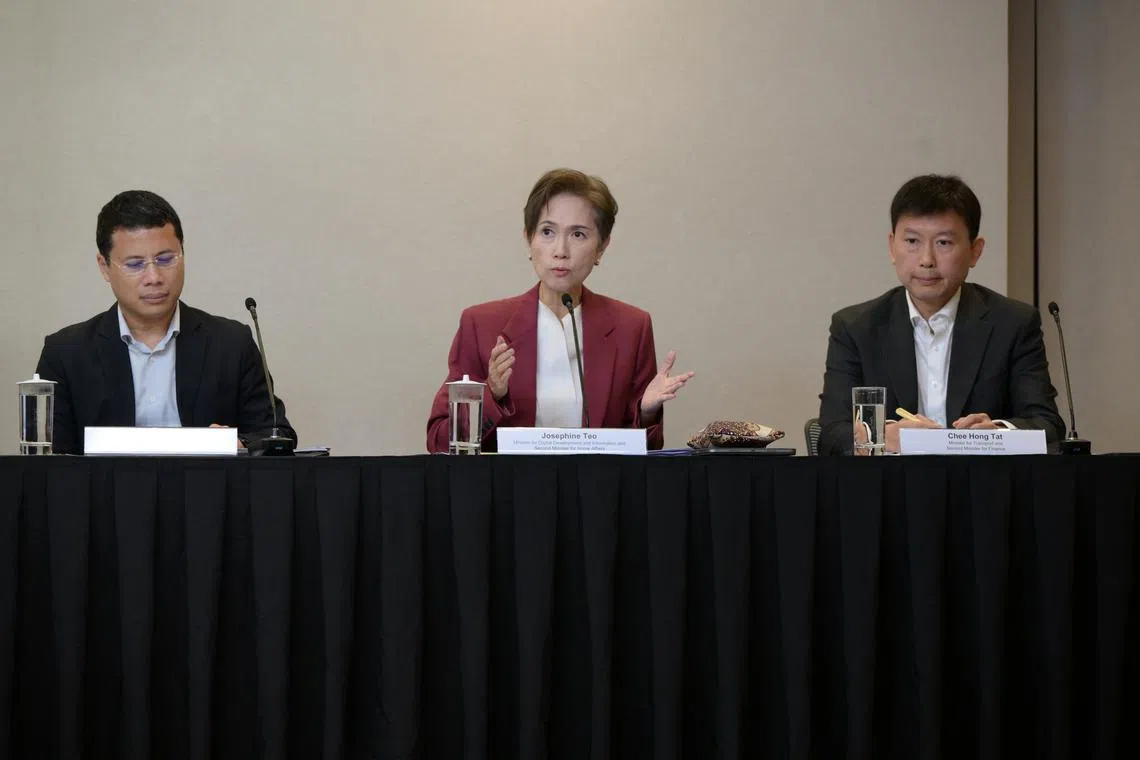More workshops, regular updates to help S’pore firms cope with US tariffs: Josephine Teo
Sign up now: Get ST's newsletters delivered to your inbox

(From left) National Development Minister Desmond Lee, Digital Development and Information Minister Josephine Teo and Transport Minister Chee Hong Tat at a press conference on April 16.
ST PHOTO: NG SOR LUAN
SINGAPORE - Singapore will organise more workshops and conferences, and have more media updates, to help firms here understand and navigate the changing business environment amid uncertainties triggered by the sweeping tariffs recently imposed by the US.
These initiatives are part of one of the three work streams in the new Singapore Economic Resilience Taskforce, chaired by Deputy Prime Minister Gan Kim Yong, which held its first meeting on April 16.
The work stream, titled “sensemaking and communication”, will focus on regular communication between the Government, businesses and workers to share updates and assess the impact of the latest developments, as well as how current schemes and measures can be of help.
It is co-led by Minister for Digital Development and Information Josephine Teo and Singapore Business Federation (SBF) chairman Lim Ming Yan.
Mrs Teo said at a media briefing on April 16 that the work stream will regularly release communications products to inform businesses on the issues they might face.
An example she raised is Enterprise Singapore’s frequently asked questions website section, which details how firms can handle the suspension of reciprocal tariffs.
“We are looking at how to make these kinds of information even easier to understand and digest,” Mrs Teo said.
“We will also look to set up dashboards so that we can look at the same set of metrics that will give us a sense of what the picture looks like,” she added.
“We expect that there will be regular media updates – this could be through a conference... or there could be other opportunities, such as workshops and seminars that we may organise from time to time.”
The work stream will also keep the public and businesses informed of the task force’s progress in a “timely and transparent” manner.
Already, Singapore companies are feeling the heat and may need guidance.
SBF’s vice-chairman Mark Lee, who was representing Mr Lim at the media briefing on April 16, noted that the tariffs have introduced significant uncertainty for businesses, which are now adopting a wait-and-see attitude.
“They are postponing their investments and expansion plans, and they are waiting for more clarity on the scope, the enforcement and exemptions coming from the US. Even those that are not directly exporting to the US, they are also watching global developments very, very closely before committing resources,” Mr Lee said.
“I think, overall, the businesses are concerned that global economic demand will slow,” he added.
Mr Lee also highlighted that SBF has established the Centre for the Future of Trade and Investment, which has conducted a national sentiment poll across its business community.
“Our objective is actually to capture the business reaction and support that businesses feel that they need, and we expect the preliminary findings to be out within the next two to three weeks,” he said.
Mr Lee said SBF held a closed-door forum on April 16, featuring insights from government, legal, logistics and financial experts. Nearly 400 business leaders attended the session, which focused on the implications of the US tariffs.
He also announced that SBF will co-host targeted export control seminars with Singapore Customs to help businesses navigate the evolving US regulations.
“We encourage firms to continue to innovate, to strengthen their value offerings and tap into Singapore’s free trade agreement network, to diversify their markets, their suppliers and to develop supply chain resilience,” he added.
Mrs Teo said many Singaporeans are aware of these “very sudden changes”.
“One day, you have tariffs being introduced, and companies are orientating in a certain direction, but the next day, some of the tariffs are being suspended, and the companies think that they need to re-orientate again, and then yet another day there is a tariff exclusion list,” she said.
Mrs Teo added that Singapore’s seniors, particularly those who remember past disruptions, understand the profound implications these changes could have for Singapore.
She said that when meeting with tertiary students, whether from universities or polytechnics, they are also well-informed and interested in how these developments will impact their job prospects.
“Our engagements and communications outreach will include them as well as part of active citizenry – the goal is to really move forward and become more resilient together,” Mrs Teo added.



